

The residents of Xishuangbanna mainly belong to Dai Minority. Dai ethnic cuisine, renowned among Yunnan Cuisine, is take sticky rice, sourness, grill and aquatic products as the principal things and seasoned with wild flavor. The representative dishes are Fragrant Bamboo Rice, Boiled Fish with Pickled Bamboo Shoot and Chili and Fish Grilled by Fragrant Grass and Charcoal.

Duosheng
Duosheng is a traditional dish made by mixing minced raw meat with condiments like salt and hot pepper. Ingredients are chicken, pork, fish and other wild animal meat. These meats is firstly cut into very small pieces, and then mixed with wild fragrant plants and pepper.
Fried Qingtai
Qingtai is a kind of processed dry grass growing in water, which is also called “Gai” or “Dao” in Dai language. Fried Qingtai is called “Gaiying” in Dai language. Firstly, some Qingtai is taken out of river and pressed into thin sheet with ginger and salt, after that it is placed under the sun and to get dried.
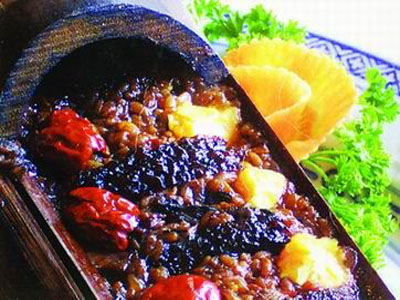
Nanmi
The most popular pepper sauce is Tomato Nanmi. Tomato Nanmi is made from small, sour tomato and hot pepper. The hot pepper will be first roasted till the skin becoming burnt slightly with a special fragrance. Then the pepper skin will be removed and some ingredients like wild coriander, fragrant nuts and some other condiments will be added to make sauce. If small crabs are added, such a Nanmi is also called Crab Nanmi.
Rice Cooked in Fragrant Bamboo
Fragrant Bamboo Rice is also called Kaolan in Dai language. This food is especially cooked in bamboo tubes with pleasant smell. When finished cooking, the bamboo membrane inside the bamboo tube will stick to the rice after some beating the bamboo tube, then the tube is cut into halves, delicious Fragrant Bamboo Rice is just before your eyes.
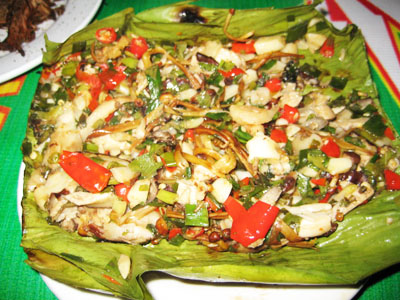
Salted Cattle Tendon
Salted Cattle Tendon is traditional famous dish of Dai Nationality, whose ingredients are heads and feet of cattle, green onion, ginger, red pepper, leaves of wild Chinese prickly ash and salt. Firstly, heads and feet of cattle are washed and scraped clean. Secondly, such heads and feet are cut into small parts and boiled properly. Thirdly, bones of such boiled heads and feet are removed and the meat is cut into strips and soaked in rice water. After a few hours, the meat is taken out and mixed with red pepper, pounded ginger, green onion, salt and leaves of wild Chinese prickly ash, and then it is persevered in a pot and kept for half a month. Finally it is ready for eating.
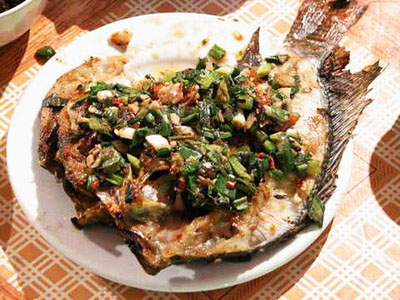
Toasted fish with Xiangmao
Scale-free fish is cut open on the back and some ingredients such as green onion, ginger, garlic, green pepper, coriander and salt are stuffed into it to be toasted as a whole.
Fish Soup with Grilled Heated Pebble
This is a special favor dish of Bulang Nationality. The way of cooking goes like this: grilled heated pebbles and fish are put into a steaming box to be braised together.
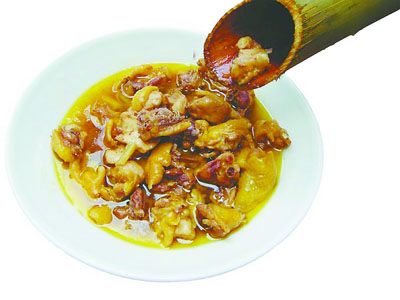 Meat Cooked in Bamboo
Meat Cooked in Bamboo
Meat Cooked in Bamboo is a famous dish of Hani Nationality. The way of cooking goes like this: firstly, meat is washed clean and cut into pieces, and then it is mixed with ginger, pepper, wild Chinese prickly ash and salt. Secondly, such a mixture is put into a piece of bamboo whose opening is covered with plantain leaves and roasted in fire. Such a dish is fragrant and delicious.
Pineapple Violet Rice
This is a special rice food of Dai Nationality. First soak some polished glutinous rice, then wash and mix it with some minced meat. Then cut a small area off a pineapple and hollow the pineapple, stuffing it with the mixture of rice and meat. At last, cover the cut and get it steamed in a wok. Sweet and delicious, the rice is good for one’s blood and lung.
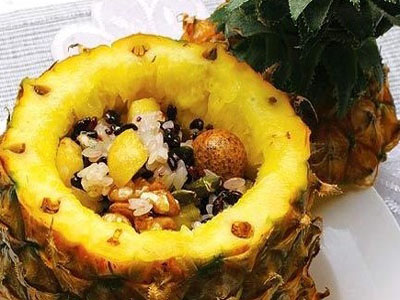
Rouya
Rouya could be the first surprising dish in Aini Nationality for strangers. The Aini people don’t think that fresh meat is not so nutritious; therefore they usually hang a piece of fresh meat out to attract flies to lie eggs on it. After a few days, maggots will appear on the meat, and then the Ainis beat the smelly meat with bamboo sticks to let those maggots fall off the meat. The maggots are collected and fried or toasted, thus coming the special favor.
Sour Ant Eggs
It is a good time to dig out Sour Ant Eggs in March or April. The cooking of Sour Ant Eggs is rather easy. You scramble pepper, garlic and salt with pig oil and then add in ant eggs and boil for about half an hour. Full of rich protein, Sour Ant Eggs which is a specialty favor of Jinuo Nationality tastes sweet and a little sour.
You will only receive emails that you permitted upon submission and your email address will never be shared with any third parties without your express permission.
